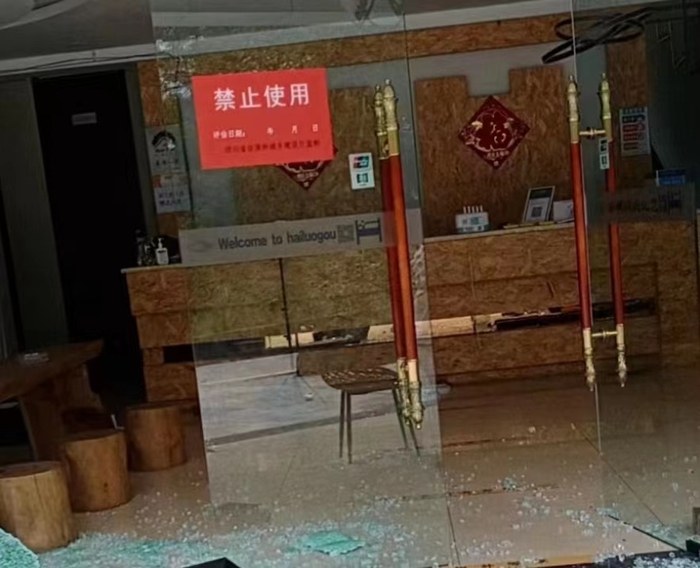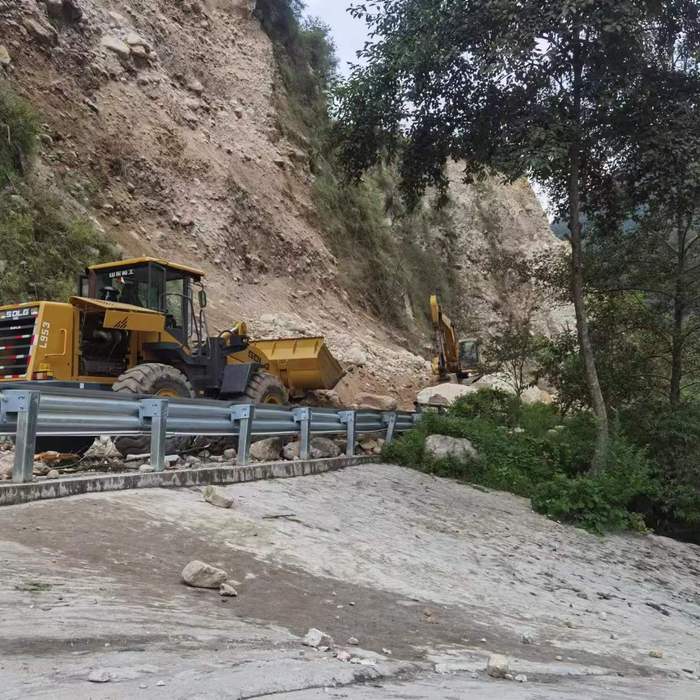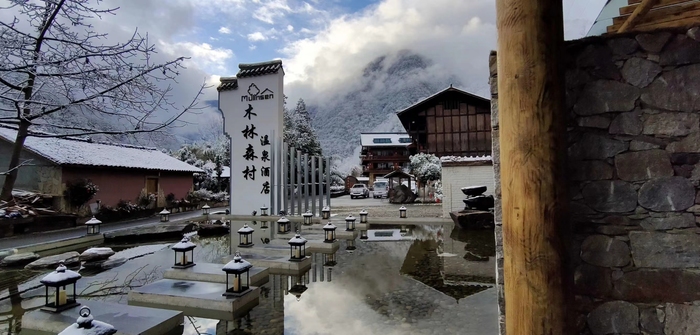Hotels around Hailuogou National Park were finally seeing large numbers of tourists after years of battling inadequate infrastructure and the pandemic hit, when an earthquake.

A house in Moxi destroyed by the earthquake on September 5. Photo from CFP
By CHENG Dafa, DONG Yuhe, ZHAO Meng
“Closed, by order” reads the sign on the door of NI Xiaolan’s spa hotel, in Moxi County in western Sichuan Province. This summer had been the best since she opened it in 2012. Freak heat waves sent tourists to Hailuogou National Park to take refuge in its fast-disappearing glaciers and forests. After months in and out of pandemic lockdowns, Ni and other local hoteliers were feeling quite pleased with themselves until an earthquake threw everything into disarray.

The year 2012, was the year that Hailuogou started its bid for 5A tourist status, a designation that can do more for occupancy rates than any publicity campaign. Thinking of nothing but a hopefully bright future, people poured their life savings into opening hotels, guest houses and restaurants. Many took on debt.
Ni left a good job at a large travel agency in Chengdu and returned to her hometown. With a bank loan and help from her brothers and sisters, she built a four-story hotel in front of the family house.
The earthquake struck just after noon on September 5. Ni was in Chengdu and unable to get in touch with her family and staff until the evening. Everyone was safe, but the hotel walls were covered in cracks. The next day, the local housing department told her that the building was uninhabitable.
WANG Zhongping broke down when he saw “Closed” signs on all nine buildings in his resort. After ten years of hard work and spending 100 million yuan (US$14 million), the 150-room property was the largest of the 300 family hotels in Hailuogou. The government is still assessing the damage, but about a third of the buildings in town are already condemned. Less than 10 percent are considered safe, at least for now.

Hailuogou opened to tourists in the late 1980s and remained largely unknown for the next two decades. Then in 2005, the Chinese National Geography magazine listed Hailuogou Glacier among the six most beautiful glaciers in the country. In 2012, the bid for 5A status was announced.
New businesses sprouted up, most owned by local families or people from other parts of Sichuan. LIN Mingchang from a small city called Deyang took over a 58-room hotel in 2016. Using his business connections, he was able to secure deals with big travel agencies. For a while, the hotel was almost full every night. But even then, Lin had his worries.
Hailuogou was then connected to the nearest city by 150 kilometers of narrow mountain road. It was a dangerous journey even for experienced drivers, who had to negotiate sharp turns and more than 200 days of rain a year. The road is sometimes closed because of floods or landslides.
The town does not have gas. Heating comes from electricity, which in peak hours overloads the grid. “You can hear fuses blow all over the place,” Lin said. His utility bill could be as much as 30,000 yuan a month. Sometimes the power went off altogether, which prompted a few bad reviews.

In 2017, there was finally light at the end of the tunnel, literally, since a new tunnel improved connectivity dramatically and Hailuogou was designated a National 5A Tourist Attraction. Hotels were all booked that summer. In some places, even staff dorms and lobbies were converted to guest rooms. New businesses were opening faster than ever, but the frenzy ended abruptly in August when a big earthquake struck Jiuzhaigou National Park 440 kilometers away.
To bring tourists back, a marketing campaign reassured people that Hailuogou “felt nothing” during the earthquake. Hotels and restaurants expanded and upgraded. Ni Xiaolan overhauled her menus and renovated rooms. Now her hotel, an 80-room property, is among the most highly rated in town, and she was elected to the National People's Congress.
From 2017 to 2019, the number of tourists increased 25 percent every year. But this offered little relief for local business owners as costs soared. Most hotels still had huge amounts of outstanding debt when the pandemic hit.
Spring and summer 2020 were quiet in Hailuogou. By the time when tourists trickled back during the October 1 national holiday, many hotels had gone bust. Lin Mingchang sold his property that winter. Those remaining are either owned by locals like Ni, or are too big to find buyers, like Wang’s.
The next year was not much better. Wang Zhongping, who by then had 100,000 yuan of interest due every month, laid off half of his workers and took on more debt.

The 2022 Winter Olympics, which had kindled the national interest in winter sports, brought in many tourists. Ni Xiaolan added a spa taking her debt to 17 million yuan, but tourists all but stopped coming as the pandemic broke out again. Her hotel was forced to shut down at least three times, but there was no pause in her loan repayment. “I had to borrow money from relatives and friends,” she said.
The government is planning bigger and more ambitious projects that will bring Hailuogou into Chengdu’s economic sphere. Extreme summer heat waves drew throngs of tourists. Ni had never made so much money. “Things were finally looking good,” she said, then the earthquake hit, and "everything was gone."